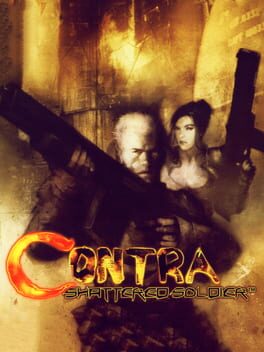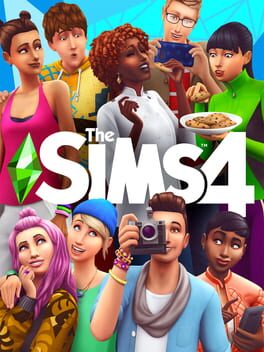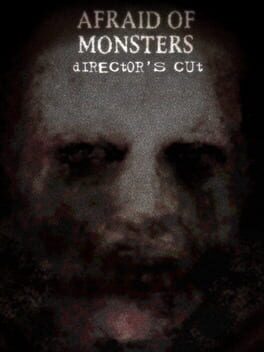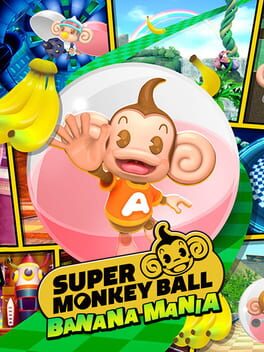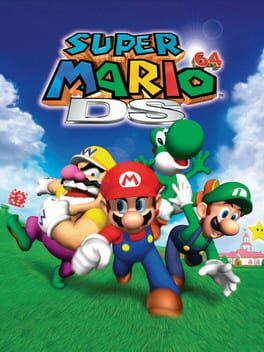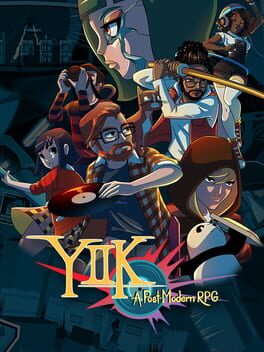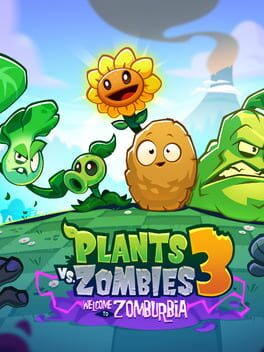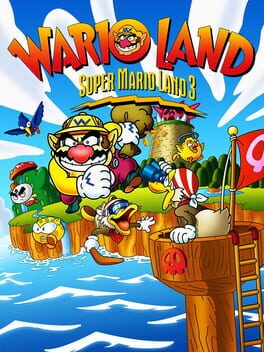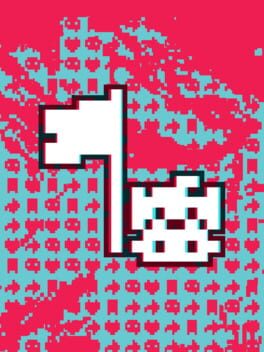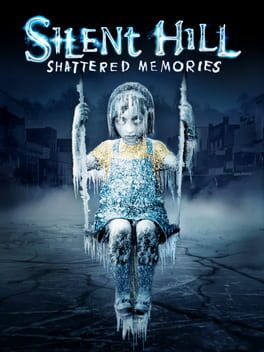Bound_Internal
BACKER
81 Reviews liked by Bound_Internal
The Sims 4
2014
It took me an embarrassingly long time to realize that my (slight) discomfort when playing the Sims comes from the fact that I constantly boot it up expecting a different experience than the developers are willing to provide. The Sims contains a truly insane range of activities, hobbies, etc. that you probably wish you had the time/money to master IRL - as things are in the Sims 4 right now, you could go to your day job (President of whatever country this is), come home, learn how to bring a ghost back to life, go skiing, build a relationship with your pet llama, and write a hit song before you have to go to work again the next day. Honestly, it's kinda rad! I like that there's a huge variety of things for your Sims to dabble in and improve at. It's nice hopping between activities and watching your Sim grow, watching them rack up a truly silly number of life achievements. Despite this, playing the Sims feels like I'm constantly speedrunning activities and careers without really getting to enjoy any of them, and it took playing Project Zomboid and a couple major Sims mods to understand why.
The Sims games are very good at simulating social interactions, to the point where just clicking someone and selecting "Friendly" gives you a downright overwhelming number of conversation choices, from telling knock-knock jokes, to trying to console them, to just unloading on the poor fucker about every hobby you have (I think the "sentiment" system is one of the best things the Sims has ever added and I really want to praise them for that, but that's a topic for another day). Improving skills, on the other hand, seems to be less about playing out the fantasy of building expertise and more about providing opportunities to socialize, acquire money, or smooth out other inconveniences (e.g. becoming so good at repairing something that you can make items unbreakable). Bringing your Do Things Level from 1 to 5 mostly looks like clicking the "Do Things" or "Research Doing Things" buttons over and over until you unlock the ability to "Do Things Quickly".
To be clear, I don't think this is a problem, I just think it's a mismatch between developer focus and what I want in a life sim. But it's clear that the Sims is capable of more, because some of the most fun I've had with the game comes from the skills that change how you interact with the game, or ones that link with other skills. Cooking is already one of the more interesting skills because it's split into 3 different types of cooking - cooking, baking, and gourmet cooking, where you have to choose portion sizes and account for the dietary preferences of the sims eating the food. Acquiring the DLC that lets you grow a garden means you can try to live entirely off your own home-grown food, and when you have virtually no money and no recipes to cook at the start, the challenge it provides was enough to single-handedly renew my interest in the game.
This is what I want more of! I think the Sims would truly ensnare players to a dangerous degree if there were more of these skills that allow you to really dedicate your attention to improving them and working with their systems. There are mods that allow you to use the systems present in the game to grow and sell drugs, interfacing with the cooking system (making edibles), the social system (can discuss/share drugs), and the aging/family system (parents can search their teens' furniture for hidden drugs). I mentioned Project Zomboid earlier, and I think the Sims could learn a lot from Zomboid's approach - the way that many skills are still primarily performed through menus, but there are additional layers of investment required to interact with them. Cooking requires that you have the correct utensils (and is done by selecting a recipe template and filling it with compatible ingredients); repairing a car requires that you have the replacement parts, the tools to remove/install said parts, and also the tools to remove/reinstall any parts that are in the way of whatever you're working on. This is a bit technical, and I think it works for Zomboid, but it would definitely require some tuning to work in the context of the Sims, which is a far more casual game with a more casual audience.
I'm asking for a lot here, because I think the Sims is at its best when it offers players the option to really get lost in a fantasy, instead of skimming the surface of twenty different fantasies. Other games will always do this better if you want to go play a dedicated Lumberjack Simulator or MouthSimulater [sic], but by adding like 20% more depth to the skills and/or changing the ways they interact with each other, the Sims may just start consuming the souls of unsuspecting players.
The Sims games are very good at simulating social interactions, to the point where just clicking someone and selecting "Friendly" gives you a downright overwhelming number of conversation choices, from telling knock-knock jokes, to trying to console them, to just unloading on the poor fucker about every hobby you have (I think the "sentiment" system is one of the best things the Sims has ever added and I really want to praise them for that, but that's a topic for another day). Improving skills, on the other hand, seems to be less about playing out the fantasy of building expertise and more about providing opportunities to socialize, acquire money, or smooth out other inconveniences (e.g. becoming so good at repairing something that you can make items unbreakable). Bringing your Do Things Level from 1 to 5 mostly looks like clicking the "Do Things" or "Research Doing Things" buttons over and over until you unlock the ability to "Do Things Quickly".
To be clear, I don't think this is a problem, I just think it's a mismatch between developer focus and what I want in a life sim. But it's clear that the Sims is capable of more, because some of the most fun I've had with the game comes from the skills that change how you interact with the game, or ones that link with other skills. Cooking is already one of the more interesting skills because it's split into 3 different types of cooking - cooking, baking, and gourmet cooking, where you have to choose portion sizes and account for the dietary preferences of the sims eating the food. Acquiring the DLC that lets you grow a garden means you can try to live entirely off your own home-grown food, and when you have virtually no money and no recipes to cook at the start, the challenge it provides was enough to single-handedly renew my interest in the game.
This is what I want more of! I think the Sims would truly ensnare players to a dangerous degree if there were more of these skills that allow you to really dedicate your attention to improving them and working with their systems. There are mods that allow you to use the systems present in the game to grow and sell drugs, interfacing with the cooking system (making edibles), the social system (can discuss/share drugs), and the aging/family system (parents can search their teens' furniture for hidden drugs). I mentioned Project Zomboid earlier, and I think the Sims could learn a lot from Zomboid's approach - the way that many skills are still primarily performed through menus, but there are additional layers of investment required to interact with them. Cooking requires that you have the correct utensils (and is done by selecting a recipe template and filling it with compatible ingredients); repairing a car requires that you have the replacement parts, the tools to remove/install said parts, and also the tools to remove/reinstall any parts that are in the way of whatever you're working on. This is a bit technical, and I think it works for Zomboid, but it would definitely require some tuning to work in the context of the Sims, which is a far more casual game with a more casual audience.
I'm asking for a lot here, because I think the Sims is at its best when it offers players the option to really get lost in a fantasy, instead of skimming the surface of twenty different fantasies. Other games will always do this better if you want to go play a dedicated Lumberjack Simulator or MouthSimulater [sic], but by adding like 20% more depth to the skills and/or changing the ways they interact with each other, the Sims may just start consuming the souls of unsuspecting players.
Medium. No story spoilers.
This game is a mod for Half-Life, and is not able to be launched standalone unlike its spiritual successor, Cry of Fear. To install it grab the game from ModDB, you can simply dump the contents of AoMDC into the Half-Life folder (or use an installer it may have come with), restart Steam, and launch the game. As of the Anniversary release of Half-Life, this is fully (or mostly?) functional.
Afraid of Monsters: Directors Cut is a little horror mod that I recommend any fan of horror (especially Silent Hill), and Half-Life, check out. It has a lot of very cool locations to explore, and can be a fun little challenge, even if a little short. The game also unfortunately suffers from a lot of little jank, some of which can hinder player progression. I am not sure if some of this is due to the Half-Life anniversary update, but some of it was definitely in the version(s) prior, namely doors being annoying at times.
The premise of the game is simple. David Leatherhoff is a man in the hospital, presumably in rehabilitation for drug related problems. He enters the restroom to reflect, and finds a bottle of the exact pills he is trying to get clean from. He unfortunately loses his brief battle with himself, takes the pills, and blacks out in the bathroom. After waking up from a nightmare, he finds the hospital, seemingly completely abandoned. In order to get to wherever he wants to be for whatever reason, he must turn the power off to not get electrocuted. Once he does that, he eventually succumbs to the real nightmare, as figures with rapidly twitching heads begin pursuing him and attacking him violently. Your new objective, is to escape the hospital, and survive this onslaught, in search of a safe place.
Afraid of Monsters' opening, while incredibly simple, is the game at it's most effective. I could not pretend that the visual of a faint figure, rapidly twitching and running toward me in a near pitch-black room, didn't immediately terrify me. The kind-of shitty flashlight from Half-Life only really improves this factor to me, as it is very hard to see, and you can only often get glimpses of these enemies at a time.
The main resources the player is fighting for is pills (healing items), batteries for the flashlight, and weaponry or ammunition to fend off various creatures to progress. Most levels involve the player pressing buttons or picking up keys to unlock colored doors to escape their setting, as you will come across many various settings such as a city, a forest, an apartment complex, etc. I think that the hospital is the strongest setting in this game, and it ultimately peaks right at the beginning. Once you leave the hospital, you will find yourself in largely uninteresting areas with the same ultimate goal of escaping this nightmare. I find that these other areas, aside from a few short segments reminiscent of Silent Hill's otherworld, just don't scratch the horror itch in a way that I would like.
While the successor, Cry of Fear, could be interpreted as a survival horror game, Afraid of Monsters is most strictly an action-horror game. Resource management is largely limited to batteries, which don't necessarily have to be managed since the battery can "recharge" for a moment, and there are no real puzzles beyond grabbing an item to use another item. You must simply blast your way through these levels, and I sort of appreciate that on it's own, since it does make playing AoM pretty easy as a sort of "pick it up and finish it" ordeal. Both games are very bluntly portraying the character's personal struggles, and I think both games work that into the games themselves pretty decently.
As for more general cons of the game, I find that the potential for things to get you "stuck" is pretty significant. Most notably, elevators may cause your character to get stuck, and then take damage when the elevator moves again, forcing you to reload a save. I recommend saving often, but especially prior to using an elevator. I found that crouch-jumping just before the arrival of a new floor helped prevent getting stuck. There are other smaller things, such as doors continuously opening and closing, and some unintuitive interactive objects. This game really slows down just before you reach the end, and while it is incredibly short anyways (shorter if you use typical goldsrc movement tech), it can make one feel like they're burning out before they reach the end.
The game has 4 endings, and some endings being pursued can cause you to take a different path to the end, with some differing levels along the way. This does introduce replay value that a player may find valuable, and it also spices up things like Sven Co-Op playthroughs. All of the endings are incredibly predictable regarding this subject matter, but I do like the way they're presented. I encourage you to try this out if you enjoy Silent Hill and/or Half-Life, but don't expect a hidden horror gem, this is just a fun time, and be sure to check out Cry of Fear afterwards.
This game is a mod for Half-Life, and is not able to be launched standalone unlike its spiritual successor, Cry of Fear. To install it grab the game from ModDB, you can simply dump the contents of AoMDC into the Half-Life folder (or use an installer it may have come with), restart Steam, and launch the game. As of the Anniversary release of Half-Life, this is fully (or mostly?) functional.
Afraid of Monsters: Directors Cut is a little horror mod that I recommend any fan of horror (especially Silent Hill), and Half-Life, check out. It has a lot of very cool locations to explore, and can be a fun little challenge, even if a little short. The game also unfortunately suffers from a lot of little jank, some of which can hinder player progression. I am not sure if some of this is due to the Half-Life anniversary update, but some of it was definitely in the version(s) prior, namely doors being annoying at times.
The premise of the game is simple. David Leatherhoff is a man in the hospital, presumably in rehabilitation for drug related problems. He enters the restroom to reflect, and finds a bottle of the exact pills he is trying to get clean from. He unfortunately loses his brief battle with himself, takes the pills, and blacks out in the bathroom. After waking up from a nightmare, he finds the hospital, seemingly completely abandoned. In order to get to wherever he wants to be for whatever reason, he must turn the power off to not get electrocuted. Once he does that, he eventually succumbs to the real nightmare, as figures with rapidly twitching heads begin pursuing him and attacking him violently. Your new objective, is to escape the hospital, and survive this onslaught, in search of a safe place.
Afraid of Monsters' opening, while incredibly simple, is the game at it's most effective. I could not pretend that the visual of a faint figure, rapidly twitching and running toward me in a near pitch-black room, didn't immediately terrify me. The kind-of shitty flashlight from Half-Life only really improves this factor to me, as it is very hard to see, and you can only often get glimpses of these enemies at a time.
The main resources the player is fighting for is pills (healing items), batteries for the flashlight, and weaponry or ammunition to fend off various creatures to progress. Most levels involve the player pressing buttons or picking up keys to unlock colored doors to escape their setting, as you will come across many various settings such as a city, a forest, an apartment complex, etc. I think that the hospital is the strongest setting in this game, and it ultimately peaks right at the beginning. Once you leave the hospital, you will find yourself in largely uninteresting areas with the same ultimate goal of escaping this nightmare. I find that these other areas, aside from a few short segments reminiscent of Silent Hill's otherworld, just don't scratch the horror itch in a way that I would like.
While the successor, Cry of Fear, could be interpreted as a survival horror game, Afraid of Monsters is most strictly an action-horror game. Resource management is largely limited to batteries, which don't necessarily have to be managed since the battery can "recharge" for a moment, and there are no real puzzles beyond grabbing an item to use another item. You must simply blast your way through these levels, and I sort of appreciate that on it's own, since it does make playing AoM pretty easy as a sort of "pick it up and finish it" ordeal. Both games are very bluntly portraying the character's personal struggles, and I think both games work that into the games themselves pretty decently.
As for more general cons of the game, I find that the potential for things to get you "stuck" is pretty significant. Most notably, elevators may cause your character to get stuck, and then take damage when the elevator moves again, forcing you to reload a save. I recommend saving often, but especially prior to using an elevator. I found that crouch-jumping just before the arrival of a new floor helped prevent getting stuck. There are other smaller things, such as doors continuously opening and closing, and some unintuitive interactive objects. This game really slows down just before you reach the end, and while it is incredibly short anyways (shorter if you use typical goldsrc movement tech), it can make one feel like they're burning out before they reach the end.
The game has 4 endings, and some endings being pursued can cause you to take a different path to the end, with some differing levels along the way. This does introduce replay value that a player may find valuable, and it also spices up things like Sven Co-Op playthroughs. All of the endings are incredibly predictable regarding this subject matter, but I do like the way they're presented. I encourage you to try this out if you enjoy Silent Hill and/or Half-Life, but don't expect a hidden horror gem, this is just a fun time, and be sure to check out Cry of Fear afterwards.
Silent Hill 2
2001
Content Warning for Attempted Suicide, Terminal Illness, Death, and Chronic Illness
----------------------------------------------------------------------------------------
It’s September 2011 and I’m seventeen years old when I try to kill myself. There are two ponds near my parent’s house. It’s like 4 AM. I like to be out this early. Nobody else is awake, and they won’t be for a while. It’s like the whole world belongs to me. I wander around between the neighborhoods, along the roads, and in the fields. In ten years these will be fresh real estate properties but today they’re still farmland. This hour and a half is the only time the anxiety quells. The real world never knows peace. There’s a dread that accompanies every action and every moment; living in that house, going to school, hanging out with my friends (are they my friends? They are but I won’t be able to understand that until I’m healthier). I’ll always have to go back home. I’ll never be able to articulate what’s happening to me. The pressure is too intense. I don’t plan it, but, the pond is right there, and it’s deep enough, and early enough that no one will hear me. Not having a plan is what saves my life. Turns out impromptu self-drownings are difficult to pull off when the water is still and not THAT deep. So, it doesn’t work, and I’m soaked, and grateful to get home and hide the evidence before my parents wake up, but I don’t feel BETTER. I feel despair, still. There’s no way out. I wish I could just climb up the stairwell, out of this. I wish I had the clarity to understand what was wrong with me.
----------------------------------------------------------------------------------------
What do you even say about Silent Hill 2? To say that it’s one of the best video games ever made feels simultaneously obvious and like I’m underselling it, right? Fuckin, uhhhh, Resident Evil 2 is one of the best video games ever made. Ace Attorney 3 is one of the best games ever made. Come on! When we see people talk about old games that they like they’ll so often say stuff like “it holds up really well for its age” or some similar comment that implies that progress is the same as quality. This is, of course, nonsense. I wouldn’t say video games are better as a medium in 2021 than they were in 2001; on the whole and in the mainstream I would say they’re demonstrably worse in almost every way – how they look, how they sound, how they feel. Silent Hill 2 was a AAA game. What do we get now instead? Far Cry 6? The fuckin, THE MEDIUM? We’ve lost everything in pursuit of bad lighting and looking like a mediocre episode of whatever was popular on HBO three years ago. Silent Hill 2 looks great and sounds great and fuck you it plays great too it feels good and even the puzzles are MOSTLY FINE. MOSTLY. Listen I’m saying this is the all time best video game I’m not saying it fuckin ended world hunger.
----------------------------------------------------------------------------------------
It’s October 2012, I’m nineteen and I’m sitting in a business communications class when I get the text confirmation that Sam’s brain tumor is back, again. It’s not the first time, and I know that there’s nothing left to do, he’s going to die. It’s fast, untreated. He’s one of my best friends, and the only person I know from home who went to the same college as me, but we live really far apart on a big urban campus and I haven’t seen him as much as I’d have liked to. Now he’s gonna spend the rest of his time with his family back home. When I see him next it’s at a hometown charity event for his family in December. He’s unrecognizable physically, and he can’t speak. The event is at our old catholic elementary school, in the gym, where in the years since we graduated they’ve painted a giant tiger on the wall. It’s the school mascot. I feel incredibly awkward around him and spend most of the time away with our other friends. I only speak to him briefly, and when I do it’s a stupid joke about the tiger mural. These will be my last words to him. I do know this will be the case, I think. Later that month I’ll be one of his pallbearers. I spend a lot of time angry and ashamed of myself for not being better to him, not knowing how to act or what to say. I’m about to drop out of school for reasons financial and related to my mental health.
----------------------------------------------------------------------------------------
So what DO you say about Silent Hill 2? That it’s a masterpiece? That it’s the most well-conceived and executed video game ever made? That every detail of it dovetails into every other in a legitimately perfect cocktail story, presentation, and play? That the performances, cinematography, soundscape, all of it are untouchably top of their class? That when Mary reads the letter at the end I WEEP because it’s one of the best pieces of acting I’ve ever heard? That if I ever meet Troy Baker it’s ON SIGHT? These things are all true. We all know it. Everybody knows this. It’s Silent Hill 2.
----------------------------------------------------------------------------------------
It’s August 2019, I’m twenty-five and I’ve just managed to graduate college in time to move to a new city with my partner as she enters her third year of medical school. That’s the year they kick you out of the classroom and you start going to the hospitals to do your real hands-on training month to month. I’m job hunting unsuccessfully and we’re living exclusively off her loans, when what seems at first like a pulled lower back muscle becomes a fruitless early morning ER trip (five hours, no results, not seen by a doctor) becomes an inability to get out of bed becomes a forced leave of absence. Without a diagnosis she can’t get disability accommodations. While on a leave of absence we can’t have her loans, and in fact we have to pay them back. We’re getting desperate, thousands of dollars in debt, and I take the first soul sucking job I can find. It takes almost a full year of visits to increasingly specialized physicians but eventually my partner is diagnosed with non radiographic axial spondyloarthritis, an extremely rare condition that culminates in the fusion of the spinal column. We can treat the pain, sort of, but it’s only a matter of time until it’s likely to evolve into a more serious condition, she’ll never have the strength or stamina she had before, and the treatment options are expensive and difficult. Her diagnosis doesn’t even officially exist as a recognized condition that people can have until September 2020.
Suddenly I am a caretaker and everything is different now. Obviously our mood is stressed from the financial dangers, but she’s in pain, terrible pain, constantly for months. She can’t sleep, she can’t eat. There’s nothing I can do. It’s exhausting to live like that. She’s depressed. On good days we try to walk outside but good days are few and far between, and grow fewer over time, and her body makes her pay for the walks. She’s on drugs, a lot of them. Do they help? It’s unclear. They don’t make her feel BETTER. Nobody knows what’s wrong with her. Her school thinks she’s faking, they’re trying to concoct ways to get her kicked out. She wants to die. It breaks my heart. She’s everything to me, all that there is. She has literally saved my life. And I can’t help her. But it’s exhausting for me too. I don’t want to admit this, not even privately, to myself. It is hard to be the person who is leaned on, especially when the person you love can’t give anything back. I’m tired. I’m not angry, and I don’t think I’m resentful. But I’m tired. I feel shame for thinking about it, for acknowledging it. I know it’s silly to feel the shame but it’s there. I do find a job eventually, thankfully, but it’s still a long time before we get a diagnosis, much less an effective treatment. Even after things settle somewhat, it’s a hard year. And there are hard times to come.
----------------------------------------------------------------------------------------
Ever since I first played it as a teen, Silent Hill 2 is a game that has haunted me through life, like a memory. It struck a deep chord with me when I was too young for that to be fair, too young to identify why I could relate to these people and their ghosts. I used to think this was a special relationship that I had with the game, the way you kind of want to think you have these when you’re younger, but the older I get the more I recognize this as part of growing up. Silent Hill 2 doesn’t resonate with me because I’ve encountered situations in life that closely mirror that of the protagonist. I mean, Angela’s story resonates deeply with me despite little overlap in the specifics of our family traumas. Silent Hill 2 touches me – and most of us – so deeply, because it has such a keen understanding of what it feels like to be Going Through It. It is a game that knows what it is to grieve, to despair, to soak in the fog, and also, maybe, to feel a catharsis, if you’re lucky, and you do the work.
I’ve been Angela, parts of her. I’ve been Laura too. I’ve had more James in me than I would prefer. I suspect all of us have these people, these feelings in us, to some degree or another. We collect them as we get older. That’s just part of it. Silent Hill 2 isn’t a happy game, but it’s one that Gets It, and lets us explore those spaces in a safe and cathartic way. It does this about as well as any piece of media I’ve encountered, on top of being so excellent at all the cinematic and video game stuff. But that’s really what makes it what it is. The empathy, and the honesty. I think it’s beautiful.
----------------------------------------------------------------------------------------
It’s September 2011 and I’m seventeen years old when I try to kill myself. There are two ponds near my parent’s house. It’s like 4 AM. I like to be out this early. Nobody else is awake, and they won’t be for a while. It’s like the whole world belongs to me. I wander around between the neighborhoods, along the roads, and in the fields. In ten years these will be fresh real estate properties but today they’re still farmland. This hour and a half is the only time the anxiety quells. The real world never knows peace. There’s a dread that accompanies every action and every moment; living in that house, going to school, hanging out with my friends (are they my friends? They are but I won’t be able to understand that until I’m healthier). I’ll always have to go back home. I’ll never be able to articulate what’s happening to me. The pressure is too intense. I don’t plan it, but, the pond is right there, and it’s deep enough, and early enough that no one will hear me. Not having a plan is what saves my life. Turns out impromptu self-drownings are difficult to pull off when the water is still and not THAT deep. So, it doesn’t work, and I’m soaked, and grateful to get home and hide the evidence before my parents wake up, but I don’t feel BETTER. I feel despair, still. There’s no way out. I wish I could just climb up the stairwell, out of this. I wish I had the clarity to understand what was wrong with me.
----------------------------------------------------------------------------------------
What do you even say about Silent Hill 2? To say that it’s one of the best video games ever made feels simultaneously obvious and like I’m underselling it, right? Fuckin, uhhhh, Resident Evil 2 is one of the best video games ever made. Ace Attorney 3 is one of the best games ever made. Come on! When we see people talk about old games that they like they’ll so often say stuff like “it holds up really well for its age” or some similar comment that implies that progress is the same as quality. This is, of course, nonsense. I wouldn’t say video games are better as a medium in 2021 than they were in 2001; on the whole and in the mainstream I would say they’re demonstrably worse in almost every way – how they look, how they sound, how they feel. Silent Hill 2 was a AAA game. What do we get now instead? Far Cry 6? The fuckin, THE MEDIUM? We’ve lost everything in pursuit of bad lighting and looking like a mediocre episode of whatever was popular on HBO three years ago. Silent Hill 2 looks great and sounds great and fuck you it plays great too it feels good and even the puzzles are MOSTLY FINE. MOSTLY. Listen I’m saying this is the all time best video game I’m not saying it fuckin ended world hunger.
----------------------------------------------------------------------------------------
It’s October 2012, I’m nineteen and I’m sitting in a business communications class when I get the text confirmation that Sam’s brain tumor is back, again. It’s not the first time, and I know that there’s nothing left to do, he’s going to die. It’s fast, untreated. He’s one of my best friends, and the only person I know from home who went to the same college as me, but we live really far apart on a big urban campus and I haven’t seen him as much as I’d have liked to. Now he’s gonna spend the rest of his time with his family back home. When I see him next it’s at a hometown charity event for his family in December. He’s unrecognizable physically, and he can’t speak. The event is at our old catholic elementary school, in the gym, where in the years since we graduated they’ve painted a giant tiger on the wall. It’s the school mascot. I feel incredibly awkward around him and spend most of the time away with our other friends. I only speak to him briefly, and when I do it’s a stupid joke about the tiger mural. These will be my last words to him. I do know this will be the case, I think. Later that month I’ll be one of his pallbearers. I spend a lot of time angry and ashamed of myself for not being better to him, not knowing how to act or what to say. I’m about to drop out of school for reasons financial and related to my mental health.
----------------------------------------------------------------------------------------
So what DO you say about Silent Hill 2? That it’s a masterpiece? That it’s the most well-conceived and executed video game ever made? That every detail of it dovetails into every other in a legitimately perfect cocktail story, presentation, and play? That the performances, cinematography, soundscape, all of it are untouchably top of their class? That when Mary reads the letter at the end I WEEP because it’s one of the best pieces of acting I’ve ever heard? That if I ever meet Troy Baker it’s ON SIGHT? These things are all true. We all know it. Everybody knows this. It’s Silent Hill 2.
----------------------------------------------------------------------------------------
It’s August 2019, I’m twenty-five and I’ve just managed to graduate college in time to move to a new city with my partner as she enters her third year of medical school. That’s the year they kick you out of the classroom and you start going to the hospitals to do your real hands-on training month to month. I’m job hunting unsuccessfully and we’re living exclusively off her loans, when what seems at first like a pulled lower back muscle becomes a fruitless early morning ER trip (five hours, no results, not seen by a doctor) becomes an inability to get out of bed becomes a forced leave of absence. Without a diagnosis she can’t get disability accommodations. While on a leave of absence we can’t have her loans, and in fact we have to pay them back. We’re getting desperate, thousands of dollars in debt, and I take the first soul sucking job I can find. It takes almost a full year of visits to increasingly specialized physicians but eventually my partner is diagnosed with non radiographic axial spondyloarthritis, an extremely rare condition that culminates in the fusion of the spinal column. We can treat the pain, sort of, but it’s only a matter of time until it’s likely to evolve into a more serious condition, she’ll never have the strength or stamina she had before, and the treatment options are expensive and difficult. Her diagnosis doesn’t even officially exist as a recognized condition that people can have until September 2020.
Suddenly I am a caretaker and everything is different now. Obviously our mood is stressed from the financial dangers, but she’s in pain, terrible pain, constantly for months. She can’t sleep, she can’t eat. There’s nothing I can do. It’s exhausting to live like that. She’s depressed. On good days we try to walk outside but good days are few and far between, and grow fewer over time, and her body makes her pay for the walks. She’s on drugs, a lot of them. Do they help? It’s unclear. They don’t make her feel BETTER. Nobody knows what’s wrong with her. Her school thinks she’s faking, they’re trying to concoct ways to get her kicked out. She wants to die. It breaks my heart. She’s everything to me, all that there is. She has literally saved my life. And I can’t help her. But it’s exhausting for me too. I don’t want to admit this, not even privately, to myself. It is hard to be the person who is leaned on, especially when the person you love can’t give anything back. I’m tired. I’m not angry, and I don’t think I’m resentful. But I’m tired. I feel shame for thinking about it, for acknowledging it. I know it’s silly to feel the shame but it’s there. I do find a job eventually, thankfully, but it’s still a long time before we get a diagnosis, much less an effective treatment. Even after things settle somewhat, it’s a hard year. And there are hard times to come.
----------------------------------------------------------------------------------------
Ever since I first played it as a teen, Silent Hill 2 is a game that has haunted me through life, like a memory. It struck a deep chord with me when I was too young for that to be fair, too young to identify why I could relate to these people and their ghosts. I used to think this was a special relationship that I had with the game, the way you kind of want to think you have these when you’re younger, but the older I get the more I recognize this as part of growing up. Silent Hill 2 doesn’t resonate with me because I’ve encountered situations in life that closely mirror that of the protagonist. I mean, Angela’s story resonates deeply with me despite little overlap in the specifics of our family traumas. Silent Hill 2 touches me – and most of us – so deeply, because it has such a keen understanding of what it feels like to be Going Through It. It is a game that knows what it is to grieve, to despair, to soak in the fog, and also, maybe, to feel a catharsis, if you’re lucky, and you do the work.
I’ve been Angela, parts of her. I’ve been Laura too. I’ve had more James in me than I would prefer. I suspect all of us have these people, these feelings in us, to some degree or another. We collect them as we get older. That’s just part of it. Silent Hill 2 isn’t a happy game, but it’s one that Gets It, and lets us explore those spaces in a safe and cathartic way. It does this about as well as any piece of media I’ve encountered, on top of being so excellent at all the cinematic and video game stuff. But that’s really what makes it what it is. The empathy, and the honesty. I think it’s beautiful.
Silent Hill 2
2001
Elden Ring
2022
Super Mario 64 DS
2004
nintendo salvaging the american gaming market with the release of the NES was the modern inflection point for our industry, in some ways that are less obvious than others. the console enshrined gaming as a medium with legitimacy beyond the original fad-like relevance of the atari VCS, but the centralization of this success around nintendo gave the company an uncomfortable amount of leverage. this immediately portended poorly with the simultaneous release of the console's killer app: super mario bros., which gestured to a sinister rejection of the console's original intent. look to the japanese launch line-up and you'll see arcade staples such as donkey kong and popeye; games that lauded precise, restricted play with definitive rules and short runtimes. super mario bros. was a refutation of this design philosophy in favor of the loosey-goosey variable jump heights, frequent health restoration items, and long hallways of copy-paste content replacing the tightly paced experiences that defined the era before. the NES still featured arguably the greatest console expressions of the rigorous arcade action experiences that defined the '80s - castlevania, ninja gaiden, and the early mega mans all come to mind - but the seeds super mario bros. planted would presage a shift into more and more experiences that coddled the player rather than testing their fortitude. in some ways, super mario bros. lit the match that would leave our gaming landscape in the smoldering ruins of the AAA design philosophy.
the '90s only deepened nintendo's exploration of trends that would further attempt to curb the arcade philosophy, which still floated on thanks to the valiant efforts of their competitors at sega, capcom, konami, and others. super mario world kicked off nintendo's 16-bit era with an explicitly non-linear world map that favored the illusion of charting unknown lands over the concrete reality of learning play fundamentals, and its pseudo-sequel yoshi's island would further de-emphasize actual platforming chops by giving the player a generous hover and grading them on their ability to pixel hunt for collectables rather than play well, but the most stunning example of nintendo's decadence in this era is undoubtedly donkey kong '94. the original donkey kong had four levels tightly wound around a fixed jump arc and limited ability for mario to deal with obstacles; its ostensible "remake" shat all over its legacy by infusing mario's toolkit with such ridiculous pablum such as exaggerated flip jumps, handstands, and other such acrobatics. by this point nintendo was engaging in blatant historical revisionism, turning this cornerstone of the genre into a bug-eyed circus romp, stuffed with dozens of new puzzle-centric levels that completely jettisoned any semblance of toolkit-oriented level design from the original game. and yet, this was the final fissure before the dam fully burst in 1996.
with the release of the nintendo 64 came the death knell of the industry: the analog stick. nintendo's most cunning engineers and depraved designers had cooked up a new way to hand unprecedented control to the player and tear down all obstacles standing in the way of the paternalistic head-pat of a "job well done" that came with finishing a game. with it also came this demonic interloper's physical vessel, super mario 64; the refined, sneering coalescence of all of nintendo's design tendencies up to this point. see here a game with enormous, previously unfathomable player expression, with virtually every objective solvable in myriad different ways to accommodate those who refuse to engage with the essential challenges the game offers. too lazy to even attempt some challenges at all? feel free to skip over a third of the game's "star" objectives on your way to the final boss; you can almost see the designers snickering as they copy-pasted objectives left and right, knowing that the majority of their player base would never even catch them in the act due to their zombie-like waddle to the atrociously easy finish line. even as arcade games stood proud at the apex of the early 3D era, super mario 64 pulled the ground out underneath them, leaving millions of gamers flocking to similar experiences bereft of the true game design fundamentals that had existed since the origination of the medium.
this context is long but hopefully sobering to you, the reader, likely a gamer so inoculated by the drip-feed of modern AAA slop that you likely have regarded super mario 64 as a milestone in 3D design up to now. yet, it also serves as a stark contrast to super mario 64 ds, a revelation and admission of guilt by nintendo a decade after their donkey kong remake plunged modern platformers into oblivion.
the d-pad alone is cool water against the brow of one in the throes of a desert of permissive design techniques. tightening up the input space from the shallow dazzle of an analog surface to the limitations of eight directions instantly reframes the way one looks at the open environments of the original super mario 64. sure, there's a touch screen option, but the awkward translation of a stick to the literal flat surface of the screen seems to be intentionally hobbled in order to encourage use of the d-pad. while moving in a straight line may still be simple, any sort of other action now begets a pause for reflection over the exact way one should proceed. is the sharp 45 or 90 degree turn to one side "good enough", or will I need to make a camera adjustment in-place? for this bridge, what combination of angles should I concoct in order to work through this section? the removal of analog control also forces the addition of an extra button to differentiate between running and walking, slapping the player on the wrist if they try to gently segue between the two states as in the original. the precision rewards those who aim to learn their way around the rapid shifts in speed while punishing those who hope they can squeak by with the same sloppy handling that the original game allowed.
on its own this change is crucial, but it still doesn't cure the ills of the original's permissive objective structure. however, the remake wisely adds a new character selection system that subtly injects routing fundamentals into the game's core. for starters: each of the characters has a separate moveset, and while some characters such as yoshi and luigi regrettably have the floaty hover and scuttle that I disdained in yoshi's island, it's at least balanced here by removing other key aspects of their kit such as wall jumps and punches. the addition of wario gives the game a proper "hard mode," with wario's lumbering speed and poor jump characteristics putting much-needed limiters on the game's handling. for objectives that now explicitly require wario to complete, the game is effectively barring you from abusing the superior movement of the original game by forcing you into a much more limited toolkit with rigid d-pad controls, the kind of limitations this game absolutely needed in order to shine.
that last point about objectives that specifically require a given character is key: the remake segments its objectives based on which characters are viable to use to complete them. however, while in some cases the game may telegraph which specific characters are required for a particular task, in many cases the "correct" solution is actually to bounce between the characters in real time. this is done by strategically placing hats for each of the characters throughout the map - some attached to enemies and some free-floating - which allow the player to switch on the fly. this adds new detours to the otherwise simple objectives that vastly increases their complexity: which toolkit is best suited for which part of each mission? how should my route be planned around the level to accommodate hats I need to pick up? will I be able to defeat an enemy that's guarding the hat if I had to? this decision-making fleshes out what was previously a mindless experience.
there's one additional element to this system that truly elevates it to something resembling the arcade experiences of yore. while you can enter a level as any character, entering as yoshi allows you to preemptively don the cap of any other character as you spawn in, preventing the player from having to back-track to switch characters. on the surface this seems like another ill-advised QoL feature, but some subtle features reveal something more fascinating. yoshi has no cap associated with him, so to play as him, one must enter the level with him. however, you often need to switch to another character in the middle of a level. how do you switch back? by taking damage. to solve the ridiculously overstuffed eight piece health bar of the original, this remake transforms it into a resource you expend in order to undergo transformation. sure, one could theoretically collect coins in order to replenish this resource, but this adds a new layer onto the routing that simply didn't exist in the original game, where there were so many ways to circumvent obstacles with the permissive controls that getting hit in the first place was often harder than completing the objective. by reframing the way that the player looks at their heath gauge, the game is calling to mind classic beat 'em ups, where the health gauge often doubled as a resource to expend for powerful AoE supers.
the game still suffers from much of the rotten design at the core of its forebear; these above changes are phenomenal additions, but they're grafted onto a framework that's crumbling as you delve into it. regardless, the effort is admirable. for a brief moment, nintendo offered an apology to all of those hurt by their curbstomping of the design philosophies that springboarded them into juggernaut status in the first place, and they revitalized classic design perspectives for many millions more who first entered the world of gaming after it had already been tainted by nintendo's misdeeds. the galaxy duology, released a few years after this game, attempted to rework the series from the ground up with a new appreciation for arcade design by limiting the bloated toolkit of previous games and linearizing levels, but the damage had already been done. the modern switch era has magnified nintendo's worst tendencies, putting proper execution and mechanical comprehension to the wayside as they accelerate the disturbing "the player is always right" principles that have infested their games since that original super mario bros. by looking at super mario 64 ds in this context, we at least get a glimpse of what a better world could have looked like had nintendo listened to their elders all along.
the '90s only deepened nintendo's exploration of trends that would further attempt to curb the arcade philosophy, which still floated on thanks to the valiant efforts of their competitors at sega, capcom, konami, and others. super mario world kicked off nintendo's 16-bit era with an explicitly non-linear world map that favored the illusion of charting unknown lands over the concrete reality of learning play fundamentals, and its pseudo-sequel yoshi's island would further de-emphasize actual platforming chops by giving the player a generous hover and grading them on their ability to pixel hunt for collectables rather than play well, but the most stunning example of nintendo's decadence in this era is undoubtedly donkey kong '94. the original donkey kong had four levels tightly wound around a fixed jump arc and limited ability for mario to deal with obstacles; its ostensible "remake" shat all over its legacy by infusing mario's toolkit with such ridiculous pablum such as exaggerated flip jumps, handstands, and other such acrobatics. by this point nintendo was engaging in blatant historical revisionism, turning this cornerstone of the genre into a bug-eyed circus romp, stuffed with dozens of new puzzle-centric levels that completely jettisoned any semblance of toolkit-oriented level design from the original game. and yet, this was the final fissure before the dam fully burst in 1996.
with the release of the nintendo 64 came the death knell of the industry: the analog stick. nintendo's most cunning engineers and depraved designers had cooked up a new way to hand unprecedented control to the player and tear down all obstacles standing in the way of the paternalistic head-pat of a "job well done" that came with finishing a game. with it also came this demonic interloper's physical vessel, super mario 64; the refined, sneering coalescence of all of nintendo's design tendencies up to this point. see here a game with enormous, previously unfathomable player expression, with virtually every objective solvable in myriad different ways to accommodate those who refuse to engage with the essential challenges the game offers. too lazy to even attempt some challenges at all? feel free to skip over a third of the game's "star" objectives on your way to the final boss; you can almost see the designers snickering as they copy-pasted objectives left and right, knowing that the majority of their player base would never even catch them in the act due to their zombie-like waddle to the atrociously easy finish line. even as arcade games stood proud at the apex of the early 3D era, super mario 64 pulled the ground out underneath them, leaving millions of gamers flocking to similar experiences bereft of the true game design fundamentals that had existed since the origination of the medium.
this context is long but hopefully sobering to you, the reader, likely a gamer so inoculated by the drip-feed of modern AAA slop that you likely have regarded super mario 64 as a milestone in 3D design up to now. yet, it also serves as a stark contrast to super mario 64 ds, a revelation and admission of guilt by nintendo a decade after their donkey kong remake plunged modern platformers into oblivion.
the d-pad alone is cool water against the brow of one in the throes of a desert of permissive design techniques. tightening up the input space from the shallow dazzle of an analog surface to the limitations of eight directions instantly reframes the way one looks at the open environments of the original super mario 64. sure, there's a touch screen option, but the awkward translation of a stick to the literal flat surface of the screen seems to be intentionally hobbled in order to encourage use of the d-pad. while moving in a straight line may still be simple, any sort of other action now begets a pause for reflection over the exact way one should proceed. is the sharp 45 or 90 degree turn to one side "good enough", or will I need to make a camera adjustment in-place? for this bridge, what combination of angles should I concoct in order to work through this section? the removal of analog control also forces the addition of an extra button to differentiate between running and walking, slapping the player on the wrist if they try to gently segue between the two states as in the original. the precision rewards those who aim to learn their way around the rapid shifts in speed while punishing those who hope they can squeak by with the same sloppy handling that the original game allowed.
on its own this change is crucial, but it still doesn't cure the ills of the original's permissive objective structure. however, the remake wisely adds a new character selection system that subtly injects routing fundamentals into the game's core. for starters: each of the characters has a separate moveset, and while some characters such as yoshi and luigi regrettably have the floaty hover and scuttle that I disdained in yoshi's island, it's at least balanced here by removing other key aspects of their kit such as wall jumps and punches. the addition of wario gives the game a proper "hard mode," with wario's lumbering speed and poor jump characteristics putting much-needed limiters on the game's handling. for objectives that now explicitly require wario to complete, the game is effectively barring you from abusing the superior movement of the original game by forcing you into a much more limited toolkit with rigid d-pad controls, the kind of limitations this game absolutely needed in order to shine.
that last point about objectives that specifically require a given character is key: the remake segments its objectives based on which characters are viable to use to complete them. however, while in some cases the game may telegraph which specific characters are required for a particular task, in many cases the "correct" solution is actually to bounce between the characters in real time. this is done by strategically placing hats for each of the characters throughout the map - some attached to enemies and some free-floating - which allow the player to switch on the fly. this adds new detours to the otherwise simple objectives that vastly increases their complexity: which toolkit is best suited for which part of each mission? how should my route be planned around the level to accommodate hats I need to pick up? will I be able to defeat an enemy that's guarding the hat if I had to? this decision-making fleshes out what was previously a mindless experience.
there's one additional element to this system that truly elevates it to something resembling the arcade experiences of yore. while you can enter a level as any character, entering as yoshi allows you to preemptively don the cap of any other character as you spawn in, preventing the player from having to back-track to switch characters. on the surface this seems like another ill-advised QoL feature, but some subtle features reveal something more fascinating. yoshi has no cap associated with him, so to play as him, one must enter the level with him. however, you often need to switch to another character in the middle of a level. how do you switch back? by taking damage. to solve the ridiculously overstuffed eight piece health bar of the original, this remake transforms it into a resource you expend in order to undergo transformation. sure, one could theoretically collect coins in order to replenish this resource, but this adds a new layer onto the routing that simply didn't exist in the original game, where there were so many ways to circumvent obstacles with the permissive controls that getting hit in the first place was often harder than completing the objective. by reframing the way that the player looks at their heath gauge, the game is calling to mind classic beat 'em ups, where the health gauge often doubled as a resource to expend for powerful AoE supers.
the game still suffers from much of the rotten design at the core of its forebear; these above changes are phenomenal additions, but they're grafted onto a framework that's crumbling as you delve into it. regardless, the effort is admirable. for a brief moment, nintendo offered an apology to all of those hurt by their curbstomping of the design philosophies that springboarded them into juggernaut status in the first place, and they revitalized classic design perspectives for many millions more who first entered the world of gaming after it had already been tainted by nintendo's misdeeds. the galaxy duology, released a few years after this game, attempted to rework the series from the ground up with a new appreciation for arcade design by limiting the bloated toolkit of previous games and linearizing levels, but the damage had already been done. the modern switch era has magnified nintendo's worst tendencies, putting proper execution and mechanical comprehension to the wayside as they accelerate the disturbing "the player is always right" principles that have infested their games since that original super mario bros. by looking at super mario 64 ds in this context, we at least get a glimpse of what a better world could have looked like had nintendo listened to their elders all along.
Balatro
2024
I've thought about making some games like this myself in the past but never followed up. It's sort of a game where you spend twenty minutes walking around someone's thoughts about a phase in their life, discussing their memories, emotions, lessons learned, etc. I expected something less honest and interesting based on the title, but it was both honest and pretty interesting.
I really appreciate the idea of being able to make games as a way of sharing our feelings and stories, and tools like Bitsy make that more possible. This is a good one.
And, incidentally, I'm glad to hear the author was in a better place when they made it than they were in the time they're talking about.
I really appreciate the idea of being able to make games as a way of sharing our feelings and stories, and tools like Bitsy make that more possible. This is a good one.
And, incidentally, I'm glad to hear the author was in a better place when they made it than they were in the time they're talking about.
this is my public service announcement that if you enjoy this, you will most certainly enjoy Tsumu! it's a Japanese PS1 game that plays incredibly similarly to this, except you're a forklift-certified hamster. I've included a short guide to get started on Tsumu's backloggd page if you're interested; there's hardly any language barrier to deal with so it shouldn't be too daunting.
Sometimes you play a game that maybe isn't the best in the series, but it feels like the one that's made for you. That's Shattered Memories for me. A game that delves deep into topics that resonate with me a lot. A game that, after two pretty unoriginal or weak entries, feels like a game that is actually taking advantage of what makes a franchise like Silent Hill so amazing. A game that is just, so fucking beautiful. I get not everyone will like this as much as me, but if you give it a shot, you might see something truly special.
